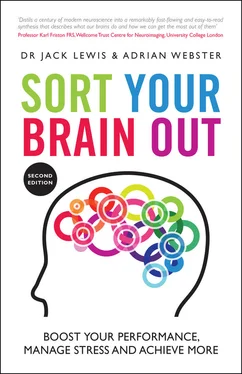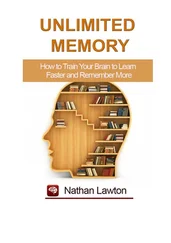Olivia Walmsley, Head of Digital Lifestyle, The Telegraph
SORT YOUR BRAIN OUT
Boost your performance, manage stress and achieve more
SECOND EDITION
Dr Jack Lewis
Adrian Webster

This edition first published 2021
© 2021 by Jack Lewis and Adrian Webster
Registered office John Wiley & Sons Ltd, The Atrium, Southern Gate, Chichester, West Sussex, PO19 8SQ, United Kingdom
For details of our global editorial offices, for customer services and for information about how to apply for permission to reuse the copyright material in this book please see our website at www.wiley.com.
All rights reserved. No part of this publication may be reproduced, stored in a retrieval system, or transmitted, in any form or by any means, electronic, mechanical, photocopying, recording or otherwise, except as permitted by the UK Copyright, Designs and Patents Act 1988, without the prior permission of the publisher.
Wiley publishes in a variety of print and electronic formats and by print‐on‐demand. Some material included with standard print versions of this book may not be included in e‐books or in print‐on‐demand. If this book refers to media such as a CD or DVD that is not included in the version you purchased, you may download this material at http://booksupport.wiley.com. For more information about Wiley products, visit www.wiley.com.
Designations used by companies to distinguish their products are often claimed as trademarks. All brand names and product names used in this book are trade names, service marks, trademarks or registered trademarks of their respective owners. The publisher is not associated with any product or vendor mentioned in this book.
Limit of Liability/Disclaimer of Warranty: While the publisher and author have used their best efforts in preparing this book, they make no representations or warranties with respect to the accuracy or completeness of the contents of this book and specifically disclaim any implied warranties of merchantability or fitness for a particular purpose. It is sold on the understanding that the publisher is not engaged in rendering professional services and neither the publisher nor the author shall be liable for damages arising herefrom. If professional advice or other expert assistance is required, the services of a competent professional should be sought.
Library of Congress Cataloging‐in‐Publication Data is Available:
A catalogue record for this book is available from the British Library.
ISBN 9780857088871 (paperback)
ISBN 9780857088895 (PDF)
ISBN 9780857088901 (Pub)
Cover Design: Wiley
Cover Image: © IrkoValenko / Shutterstock
What This Book Is All About
Every human being on this planet has the most incredible apparatus in the known universe swimming around inside their skull. Yet despite its unique capacity for working out what makes things tick, the vast majority of users are completely unaware of its stunning capabilities, let alone its tremendous capacity to adapt to the world we live in.
The human brain is able to adapt to the demands of pretty much any environment, from the isolated regions of the arctic tundra and the jungles of the tropics to the densely packed cities and even the virtual worlds online. It physically changes its circuitry to slowly but surely improve performance in more or less any behaviour that is regularly required of it. It adapts itself in a way that enables a huge variety of skills and abilities to become quicker, more accurate and more efficient the next time you come to do them.
This process of rewiring for self‐enhancement is so gradual that the day‐to‐day improvements are usually imperceptible. Only if you continue to perform that behaviour intensively (not too easy, not too hard), regularly (ideally daily) and consistently (over an extended period of weeks and months) will your brain change sufficiently for the improvements to become noticeable.
But brains don't only adapt to accommodate good behaviours. Brains adapt to perform any regularly repeated behaviour more efficiently, whether it's in our long‐term best interests or not and either way we usually end up carrying out such highly practised behaviours without giving it much thought at all. Whether it is something useful like safely steering a car down the motorway while your attention is completely focused on an absorbing podcast or radio show or not‐so‐helpful like helping yourself to that second slice of cake, your behaviour is largely controlled by a brain operating entirely on autopilot – for better and for worse.
The aim of this book is to inspire you to consider the tremendous impact that neuroplasticity – your brain's ability to physically change to deal with pretty much any set of circumstances – can have on your behaviour and to help you grasp that current beliefs and set‐piece behaviours were originally formed according to a series of chance events that happened to occur in your past and the stories that you regularly encountered in your daily life prior to now. Equally, future beliefs and behaviours will be formed according to whatever thoughts, people and places you choose to regularly, consistently and intensely engage with from now on.
Your brain is constantly upgrading the circuits inside your head that are often used and downgrading the neglected ones, every single day. Whether these changes lead to benefits or drawbacks is entirely under your control. It all boils down to spending more time in places – both real and virtual – that gradually enhance your cognitive powers and emotional well‐being and less time in those that degrade it.
By giving people a clearer understanding of how their own brains work and by changing the common but false perception that “you can't teach an old dog new tricks,” the main objective of this book is to harness the revelation that we can fundamentally change the very fabric of our brains, all the way through adulthood. As a result we can subtly alter our habitual behaviours, beliefs and motivations, and eventually bring about profound positive change. This book provides you with a wide range of simple brain‐enhancing tools and practical tips to do just that.
In the years that have elapsed since publication of the first edition, new research from the worlds of neuroscience, psychology and the medical sciences has hit the academic press. This has brought with it yet more clues about the many things we can all do to get more out of our brains on a daily basis. It has resulted in new additions for some of the original chapters and three brand new ones. So there are even more easy‐to‐follow brain optimisation principles (BOPs) for you to get your teeth into than ever before.
Many people have a burning desire to be successful, some even have the know‐how. For those who don't there are literally thousands of self‐help books out there, telling them how.
Yet, despite tsunamis of ambition and an abundant supply of well‐meant advice, only a few people achieve real success and even fewer manage to maintain it.
The main reason is that despite being the most sophisticated piece of bio‐wetware in the known universe, capable of running the most phenomenally complex software, your brain doesn't come with a user guide.
Millions of people spend their lives scurrying around, all revved up, trying to get somewhere and devouring huge volumes of information on self‐improvement. Yet they don't have a clue about the engine under their bonnet, the nature of its profound capabilities or how to get the best out of it.
Читать дальше













